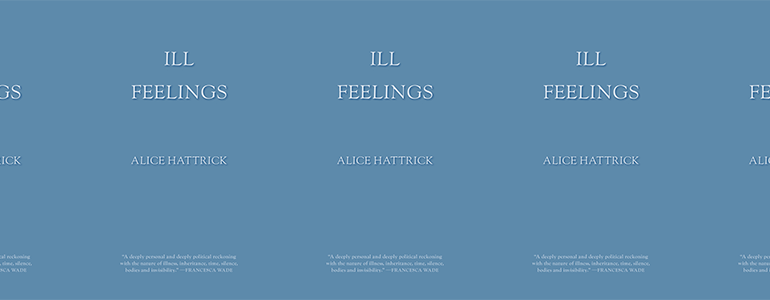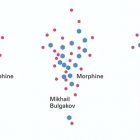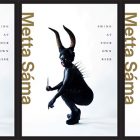Alice Hattrick’s Redefinition of Illness

My father’s heart failure feels like an impossible disease. It has existed alongside him for many years, and yet there are times when I feel like we are still trying to figure out what to do with it. I don’t mean that we, his family, are at odds over how to care for him, but more that the disease itself seems like a glitch, a blip on the screen that should never have happened. Since 2017, he has lived with a left ventricular assist device, which attaches to his heart and actively assists in pumping it for him. It has become a part of him, and yet it is not made of him. When he goes to the doctor, his heart failure diagnosis is discussed as a disease. Doctors tell him he is “a very sick man.” It is clear his body is not operating like it’s supposed to. His sickness also, at least to me, seems to extend beyond the heart failure, into a mental realm more akin to a depressive state. This is not surprising—depression is very common in individuals who have had major heart surgeries—but it seems to be the aspect of his illness that is always the least attended to. I often find myself wondering why this is, unsure of how a body can be treated separately from a mind.
Dealing with this issue head-on, Alice Hattrick’s new book, Ill Feelings, out in the US today and the UK last year, shines a light on the differences between illness, sickness, and disease. Hattrick, who was diagnosed at an early age with Myalgic Encephalomyelitis or chronic fatigue syndrome (ME/CFS) and later with Fibromyalgia, is no stranger to the pain associated with being unwell. Still, their illnesses, which are both characterized as having “symptoms of illness without any known cause,” are often written off by medical professionals, who deem the pain psychological rather than physical. Through a deep dive into the history of ME/CFS, as well as an exploration of their relationship to their mother, who shares the same ME/CFS diagnosis, Hattrick unpeels the layers of their “ill feelings” to redefine how we think about the body’s relationship to pain, in the process providing us with a new way to understand what it means to be chronically ill.
In the book, Hattrick cites findings from research undertaken by two physicians, Gordon Waddell and Mansel Aylward, who “defined illness as an ‘internal, personal experience’, and sickness as a ‘social status accorded to the ill person by society’, as distinguished from disease: ‘a disorder of structure or function of the human organism that deviates from the biological norm.’” These definitions suggest that illness has nothing to do with actually having something physically wrong with the body. Instead, it exists on its own plane, a way of being with no real ties to science or even, at times, reality. It is merely a byproduct of the mind, a person’s way of interpreting their “personal experience.” Those who are “ill” can, from a medical standpoint at least, be seen as unreliable in relation to their symptoms and desire for a cure, causing illness to become “a state of mind, not a biological reality,” Hattrick writes.
My father is clearly a physically sick man, and doctors have diagnosed him conclusively. He, as Waddell and Mansel explain, has a disease that causes his heart “a disorder of structure or function.” Yet not all of his symptoms can be traced to one diagnosis. Sure, it is true that his heart failure contributes to his state of mind, and it definitely factors—in a big way—into his physical life, but there is a part of him and his behavior that exists outside of the heart failure. It feels more akin to Hattrick’s idea of “illness,” though I admit its cause feels amorphous to me in the context of our relationship with each other. All I know is that this undiagnosed illness I perceive in him existed long before his heart weakened.
For Hattrick, illness takes on many different roles. Perhaps most importantly, it can be seen as “an archive,” a way to chronicle a person’s history and their pain. Once, I had a professor tell me that we often believe being healthy is the default for a normal life when really it is perhaps nothing more than occasional bouts of feeling okay in between sicknesses. At the time, I was surprised by this, but I soon came to understand that all lives will eventually begin to deteriorate—that perhaps my own good health was nothing more than the calm before an impending storm, nothing more than a marker, a way for me to place myself in my own particular story, my twenties catalogued under the label of “Healthy.”
But an archive must store more than labels. An archive should contain material that defines and speaks to the thing it is archiving, encompassing a certain level of detail that goes beyond one’s own story to overlap with other people’s stories as well. When Hattrick talks about “an archive of illness,” I can’t help but think of it as a collection of shared trauma, a trauma that has been passed down through history. Hattrick’s archive contains their own instances of illness but also all the instances of illness experienced by their mother, as well as the histories of similar illnesses experienced by authors like Virginia Woolf and Elizabeth Barrett Browning.
My father was born in Germany. When he was two years old, he and his sister came to the United States by boat with my grandparents, both of whom suffered traumatically before and during World War II. My grandfather, who was born and lived most of his young life in Ukraine, had his father taken away from him by Soviet soldiers in the middle of the night, never to be seen again, and my grandmother, who lived much of her life in Romania, barely managed to escape from a labor camp near the end of the war. The effects of war on my grandparents were immense, and there is no doubt their trauma was added to the archive of illness passed down to my father and his siblings. When I look at my father now, not only do I see a man struggling with heart disease, but I also see a man struggling with the illness of his familial trauma and grief.
Typically, when we talk about illness, the word is interchangeable with “sickness,” just another way of saying someone is not “well” or “healthy.” In Hattrick’s opinion, however, to be ill and to be sick are different things. They argue that people given the label of “ill,” especially when their perceived illness is one that is believed to be more mental than physical, are usually seen as “weak or lazy.” They are also often suspected of choosing to be ill, as if illness can be solicited whereas sickness cannot. When I say that I suspect my father of harboring an illness separate from his heart failure diagnosis, what I mean is that his mind often seems as if it is trapped within a steel cage. His mental anguish, which leads him through bouts of unhappiness and malaise, is often attributed to what is most dominant on his medical chart. But my father has always been a dissatisfied man, constantly fantasizing about life as a successful artist and never actually getting there. Even before his heart failure, he wallowed in his own disappointments.
It is possible my father has always been suffering from some type of undiagnosed disorder, but I am not qualified to make a guess as to what that might be. Every doctor he has met has been unable to give him a definitive reason for his heart failure. Nothing about his family medical history or his lifestyle suggests a predisposition to such a disease. Typically, he’s told his failing heart is most likely the result of a virus, though there is no way to tell for sure. Without a decisive answer for why this has happened to him, my mind is left to wonder. Did his heart fail because that is just sometimes what organs do? Or did it fail because of an undiagnosed illness brought on by carrying generations of familial trauma in his physical body?
I must make it very clear that Hattrick, who identifies as queer, spends much of Ill Feelings queering the illness narrative. While I am interested in their reworked definition of what it means to be ill, I must also acknowledge that my father is absolutely not part of the demographic Hattrick is addressing. Still, I think many of their ideas about illness as an archive apply to those suffering from generational trauma as well. My father lived an entire childhood in the US alongside his immigrant parents who struggled every day to fit in and make a life for themselves in a country hesitant to accept Germans after the war ended. This upbringing had a profound effect on his mental health, and I can only suspect that his family’s trauma has contributed greatly to his personal archive of illness.
At one point in the book, Hattrick asks themselves, “Do I have to choose between mind and body? Are they not one and the same thing?” This is the ultimate question that Ill Feelings tries to answer. There is often this belief that the kind of pain Hattrick and their mother experience—one without a “medically diagnosable” cause—is not reflective of a “true sickness” or “disease.” Typically, doctors want to attribute such physical pain to a mental one, but to Hattrick, this outdated mode of thinking can often force a patient to choose a side, making them separate their mental health from their physical health. It also impresses upon the patient the idea that if they are able to conquer their mental health, their physical health will get better as well. They will be cured of their illness—as if a cure is the only desirable outcome.
For Hattrick, illness should not be something we are constantly looking to cure. “I embrace a disabled future, rather than a cure,” they write, and by making this conscious decision to acknowledge and accept their illness, they are choosing to reject society’s notion of needing to live a life free of pain. Because ultimately, what is a life without pain? Without an archive of illness from which we can draw out an understanding of ourselves and our ancestral histories, what are we left with? Hattrick writes, “Our bodies are our archives, the storehouses of our shared knowledge,” and I think of my father with his broken heart. So often, he is a man staring off into the distance, his mind wandering to places none of us are privy to, while his body remains in the room. Maybe his heart failed because of a virus, but also maybe not. Maybe it failed because his mind was so busy looking for a cure to his archive that the pain of his suffering had to be placed somewhere else, his heart carrying the traumas of his family as he walks in circle, searching. Like Hattrick, my father “live[s] in sick time, inside [his] loop of pain. And in that time [he] gather[s].”



